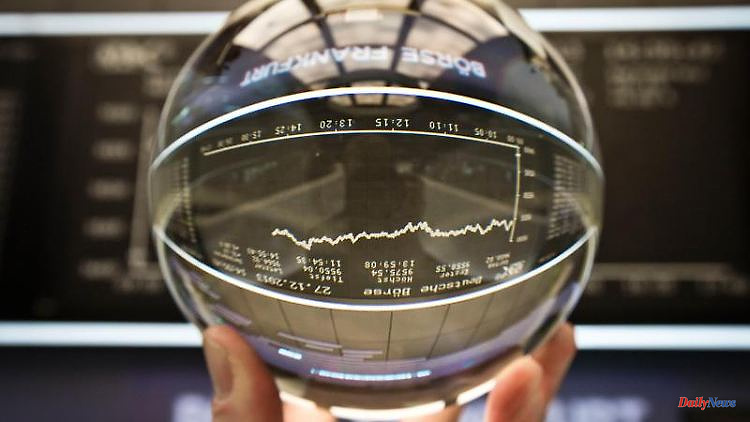2022 was not a good year for stocks. The Ukraine war, recession worries, but above all high inflation and rising interest rates have put the Dax, Dow and Co. under pressure. ntv.de discussed with three financial market experts whether the worst is over or whether the markets are once again marking new lows.
ntv.de: In the USA, inflation is falling from a high level. Does that give the US Federal Reserve enough room to stop raising interest rates any time soon?
Michael Wittek: Yes, according to my forecast, the last key interest rate hike could take place in March. One last small step at most in May.
Reinhard Pfingsten: We're less optimistic about that. We can certainly see that many inflation drivers will weaken. However, in 2022 we all learned the hard way that inflation dynamics should not be underestimated. We therefore expect that the central banks will remain restrictive in the first half of the year and that an easing is unlikely until the end of 2023.
ntv.de: How great do you rate the risk that the Fed will stop fighting inflation too early and that inflation will return after a temporary decline?
Marco Herrmann: We believe the Fed will try not to repeat the mistakes of the 1970s and 1980s. At that time, the American central bank gave up its restrictive monetary policy too early and inflation rose again.
Whitsun: Yes, the Fed will keep interest rates high for longer until there is a clear indication that inflation is really under control. The Fed also seems willing to accept the cost of such a policy, ie recession and rising unemployment.
Wittek: We consider the risk of inflation rising again to be low. The reason is the deteriorating economic development.
Won't inflation recede anyway in 2023 due to base effects? Brent oil cost between $80 and $120 a barrel last year. Compared to these high levels, the price could trade below in 2023 and dampen inflation.
Pentecost: The key question is whether that is enough. In the USA in particular, we see a completely overheated economy. There are now many more endogenous factors such as wage developments that are driving inflation. The Fed needs to get this under control.
Herrmann: That gets to the point. The wage/price spiral has long since started. At the end of 2023, inflation will still be well above the target of two percent.
Many stock market traders assume that the Fed will only get inflation under control if it forces the economy into a recession. But is that what's already happening? Aren't central banks exaggerating?
Wittek: Yes, it's quite possible that the Fed will overshoot. The American central bank sees slight growth in the US economy for 2023. I doubt that.
Herrmann: No, unfortunately the restrictive monetary policy has to be maintained for a while. At present, it is still quite easy for companies to pass on higher costs to end customers. Unfortunately, the demand side has to be further weakened.
What does this mean for corporate profits. Are the analysts' estimates realistic or do they still need to be revised downwards?
Pentecost: In fact, there still seems to be a bit too much optimism in the estimates and the effects of the recession on earnings development are not fully anticipated.
Herrmann: We see declining profits in the coming year as very likely, almost inevitable, because the central bankers have to break the pricing power of the corporations in order to tame currency depreciation. Historically, corporate earnings have typically fallen between 10 and 30 percent during a recession.
Wittek: The earnings estimates will be corrected downwards. We know that from the past. However, the revisions only come when it is simply no longer undeniable.
In the USA, tech stocks such as Amazon, Meta, the mother of Facebook, and Co., which are heavily weighted in the indices, have recently been hit by the wheels. In other areas, there were significantly smaller price losses.
Wittek: That's right, the tech stocks suffered the most from the sharp rise in interest rates. The valuations were simply too high for an interest rate level of four percent.
Whitsun: It also fits into a well-known pattern that defensive sectors with solid cash flows simply develop better with a weakening of economic momentum and a significantly more restrictive financing environment.
Amazon or Meta have recently earned significantly less and laid off employees on a large scale. Share prices have fallen sharply. Are these now introductory courses or do the business models of the tech companies no longer work?
Herrmann: Meta has a number of problems of its own that can only be transferred to others in relation to the sluggish online advertising business. Amazon and Google are cyclical victims of a flagging consumer, but structurally continue to be long-term winners. However, we regard the sell-off of the past few months as exaggerated and would use the favorable prices to enter companies with pricing power.
Wittek: In addition, the large tech companies have moats that protect their respective business models, since its uniqueness makes it difficult for potential competitors to copy it. They also usually manage without net debt.
For years there has been a boom in sustainable investments. Defense stocks and Big Oil have also done extremely well this year. Is the Ukraine war causing a paradigm shift here?
Pentecost: No, we expect that sustainability will remain a major issue. Even if other priorities were set in 2022 due to the war in Ukraine, climate change with its numerous negative effects remains the major challenge for the next few years. The war has also shown that renewable energies can help to become more energy self-sufficient.
Herrmann: The hands of institutional investors are tied by politicians. On the regulatory side, the thumbscrews will tend to be tightened further in the coming years. I therefore do not expect a wave of shifts.
Does China mean more of an opportunity or more of a risk for the equity markets in the coming year?
Wittek: Well, that's probably a black box again. China is therefore a suitable addition to diversification.
Herrmann: It depends. Some hope for the upside is certainly priced in. The adjustments to the zero-Covid policy are initially positive. However, it remains to be seen whether it can work if the population does not have sufficient vaccination protection and foreign mRNA vaccines are not approved.
Pentecost: In addition to Corona, there are still major problems in the real estate sector. The government was able to prevent the worst here. But a lot of trust was destroyed. Then there is a political risk in China: with the increasingly authoritarian orientation of politics, economic prosperity no longer seems to be the top priority.
Will stock markets retest 2022 lows in 2023? Where do you see the Dax in the course of the coming year?
Herrmann: Due to the many imponderables, the markets will move within a range of 20 percent, with a few ups and downs. Looking towards the end of 2023, we see the fair value for the Dax at 16,000 points with a P/E ratio of 13.
Wittek: There will be sectors that will no longer see their lows. The indices are largely based on the procedures of the central banks. So the next black box.
Pentecost: It is quite possible that the economy will slip into recession, but inflation is clearly too high and monetary policy will remain restrictive. Such a scenario would certainly scare off equity investors. It's also difficult to predict exactly how the recession will unfold. In addition, despite full gas storage, there is still a residual risk that the energy supply will face major problems. So it cannot be ruled out that we will see significantly lower prices again.
This publication is for informational purposes only and for the use of the recipient. It represents neither an offer nor a request on the part of or on behalf of Albrecht, Kitta












